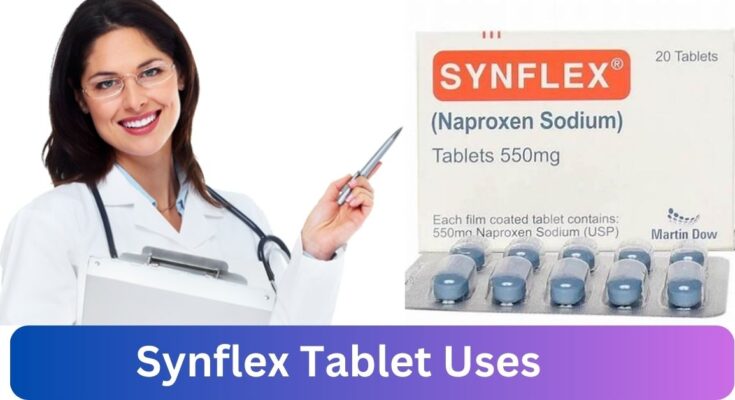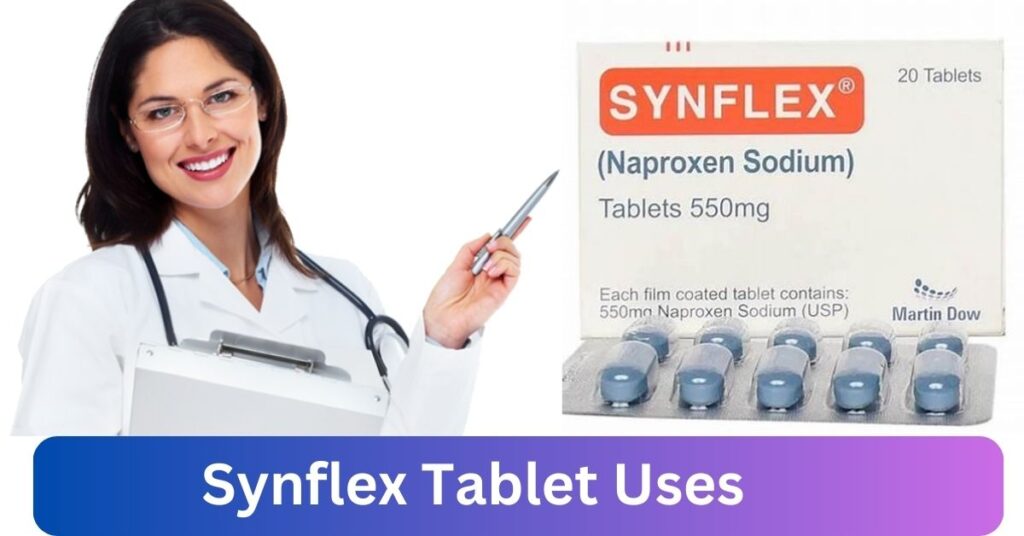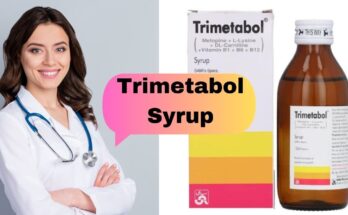Introduction to Synflex Tablet
Synflex Tablet Uses is a medication that contains naproxen and belongs to the class of non-steroidal anti-inflammatory drugs (NSAIDs). Let’s explore the key points about Synflex:
- Composition:
- Active Ingredient: Naproxen sodium.
- Inactive Ingredients: Cellulose, Magnesium stearate, Povidone, Talc, Opadry YS-1-4215.
- FDA Approval:
- Synflex is FDA-approved for use.
- It is widely prescribed for various inflammatory conditions.
- Uses:
- Synflex is effective in managing pain, inflammation, and swelling associated with:
- Rheumatoid arthritis
- Primary Dysmenorrhea (menstrual pain)
- Acute Gout
- Toothache
- And more.
- Synflex is effective in managing pain, inflammation, and swelling associated with:
- Mechanism of Action:
- Synflex works by inhibiting chemical mediators responsible for inflammation and discomfort.
- It provides short-term pain relief but does not cure underlying conditions.
- Importantly, it is non-addictive.
Synflex Tablet Uses Details and Price in Pakistan
- Active Ingredient:
- Naproxen Sodium: This NSAID (non-steroidal anti-inflammatory drug) is the primary component of Synflex tablets.
- Inactive Ingredients:
- Synflex tablets also contain the following inactive ingredients:
- Cellulose
- Magnesium stearate
- Povidone
- Talc
- Opadry YS-1-4215
- Synflex tablets also contain the following inactive ingredients:
- Available Strengths:
- Synflex tablets come in the following strengths:
- 250mg
- 275mg
- 550mg
- Synflex tablets come in the following strengths:
- Manufacturer:
- Synflex is manufactured by Martin Dow.
- Price in Pakistan (2023):
- The approximate cost of Synflex tablets in Pakistan ranges from 14 to 15 PKR per tablet.
Certainly! Here’s the Synflex Tablet Uses section for your blog:
Synflex Tablet Uses
- Rheumatoid Arthritis:
- Synflex effectively manages joint pain, reduces swelling, and alleviates stiffness associated with rheumatoid arthritis.
- It provides relief by inhibiting inflammatory processes.
- Primary Dysmenorrhea (Menstrual Pain):
- As a first-line therapy, Synflex helps relieve menstrual pain.
- It can significantly reduce discomfort during menstruation.
- Acute Gout:
- During gout flares, Synflex serves as an alternative to corticosteroids.
- It eases the pain and inflammation characteristic of acute gout attacks.
- Toothache:
- Synflex offers effective pain relief after dental procedures.
- It can be particularly helpful when dealing with toothaches.
- Other Uses:
- Synflex is also prescribed for various soft tissue injuries, migraines, sprains, and strains.
- Its anti-inflammatory properties make it versatile for managing different types of pain.
Remember to consult your healthcare provider before using Synflex, especially if you have any existing medical conditions or are taking other medications. Individual responses may vary, and professional guidance is essential.
How Synflex Works
- Inhibition of Chemical Mediators:
- Synflex acts by inhibiting chemical mediators responsible for inflammation and discomfort.
- By blocking these mediators, it helps reduce pain and swelling.
- Short-Term Pain Relief:
- Synflex provides short-term pain relief.
- It is effective for managing acute pain but does not address the underlying cause of the condition.
- Non-Addictive:
- Unlike some other pain medications, Synflex is non-addictive.
- Patients can use it without the risk of developing dependence.
Side Effects of Synflex Tablet
While Synflex can be effective for managing pain and inflammation, it’s essential to be aware of potential side effects. Here are some mild to moderate side effects associated with Synflex:
- Dizziness and Light-headedness:
- Some individuals may experience dizziness or a feeling of light-headedness while taking Synflex.
- If you feel unsteady, avoid activities that require full concentration.
- Headache and Drowsiness:
- Headaches are a common side effect.
- Synflex can also cause drowsiness in certain cases.
- Be cautious when operating machinery or driving.
- Buzzing or Ringing in the Ears (Tinnitus):
- Tinnitus, characterized by buzzing or ringing sounds in the ears, may occur.
- If this persists or becomes bothersome, consult your doctor.
- Mild Skin Rashes or Itching:
- Skin reactions, such as rashes or itching, can occur.
- If you notice any skin changes, seek medical advice.
- Stomach Upset, Nausea, and Heartburn:
- Synflex may irritate the stomach lining, leading to upset stomach, nausea, or heartburn.
- Taking it with food or milk can help minimize these effects.
Remember that individual responses may vary, and not everyone experiences these side effects. If you encounter any severe or persistent symptoms, consult your healthcare provider promptly.





